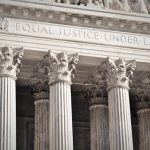How should the US balance democratic principles with the need to confront groups that shift between ballots and bombs?
Calls to ban the Muslim Brotherhood are gaining renewed momentum in Washington, reviving a debate that has long divided policymakers over how democracies should handle sprawling Islamist movements with both political and violent wings.
The Brotherhood, founded in Egypt in 1928, has proven adept at shifting between ballots and bombs. It has won elections, including briefly holding power in Cairo after the Arab Spring, but has also produced violent offshoots and backed militant groups. Hamas, a Palestinian branch, has been designated a US foreign terrorist organization since 1998.
Robert Silverman, a former senior Foreign Service officer and now editor-in-chief of the Jerusalem Strategic Tribune, addresses this challenge in his latest piece, “Effectively Banning the Muslim Brotherhood.” Speaking on the In the National Interest podcast, he argues that the United States should take a more targeted approach to the Brotherhood rather than issue a sweeping ban. “The way to do this is to designate the Egypt branches, the Sudanese branches, because they have strong track records of using violence to achieve political means,” he says. Other branches, he adds, should be warned that engaging in violence would trigger the same designation.
Silverman emphasizes that unlike autocracies in the Middle East, the United States faces legal hurdles at home. “If you just blanket designate the Muslim Brotherhood, that won’t get you very far because it will be challenged in court,” he says, noting that some American Muslim organizations have ties, however tenuous, to the Brotherhood. “The battle centers on American domestic law,” he explained.
At the same time, Silverman sees financial tools as crucial. He calls for a “State-Treasury one-two punch,” in which the State Department’s designation powers would be coupled with Treasury Department sanctions to freeze assets and choke off funding streams. “The US government has an incredible, powerful ability to turn a foreign terrorist organization designation into a devastating blow,” he said, citing the post-9/11 crackdown on al Qaeda’s financiers.
The debate touches on broader questions about the Brotherhood’s ultimate aims. Silverman noted that its founding mission was to restore a caliphate after Turkey’s abolition of the Ottoman institution in 1924. “It’s a supremacist project politically,” he argues. Whether through elections or violence, “the political aim is to achieve political power, to reestablish a universal caliphate.”
Sometimes a political party, other times a violent movement, the Brotherhood’s flexibility has made it both resilient and elusive. For US policymakers, the challenge remains how to confront an organization that can be many things at once, and yet never quite one or the other.
Listen now on Apple, Spotify, or wherever you get your podcasts.
About the Speakers:
Jacob Heilbrunn is editor of The National Interest and is a nonresident senior fellow at the Atlantic Council’s Eurasia Center. He is the author of They Knew They Were Right: The Rise of the Neocons, which The New York Times included on its 100 notable books of the year in 2008, and America Last: The Right’s Century-Long Romance with Foreign Dictators. He has written on both foreign and domestic issues for numerous publications, including The New York Times, The Washington Post, The Wall Street Journal, Financial Times, Foreign Affairs, Reuters, Washington Monthly, and The Weekly Standard. He has also written for German publications such as Cicero, Frankfurter Allgemeine Zeitung, and Der Tagesspiegel.
Robert Silverman, is a former senior US diplomat and the current editor-in-chief of the Jerusalem Strategic Tribune. He also serves as a lecturer at Shalem College and founder of the Inter Jewish Muslim Alliance.
Image: US Secretary of State Marco Rubio visits Israel on February 16, 2025 (US Embassy Jerusalem via Wikimedia Commons).


















